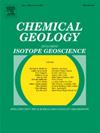稻草生物炭和有氧分解稻草释放的溶解有机硫的分子结构和光氧化行为对比
IF 3.6
2区 地球科学
Q1 GEOCHEMISTRY & GEOPHYSICS
引用次数: 0
摘要
土壤和自然水体中溶解有机硫(DOS)的光氧化作用在硫的生物地球化学循环中发挥着重要作用。然而,不同来源的 DOS 随结构变化的光氧化能力仍不清楚。在此,研究人员对水稻秸秆热解生物炭(简称 PyDOM-S,被认为是草原火灾产生的黑碳的代表)产生的热源溶解黑质(简称 PyDOM)中 DOS 的分子结构和光氧化行为进行了深入表征,并将其与水稻秸秆好氧分解产生的浸出溶解有机质(简称 LDOM-S,被认为是土壤和泥炭中富含有机质地层的一般代表)中 DOS 的分子结构和光氧化行为进行了比较。傅立叶变换离子回旋共振质谱(FT-ICR MS)分析表明,PyDOM-S 和 LDOM-S 分别以脂肪族(60.4 % 和 41.1 %)和木质素类化合物(35.1 % 和 40.1 %)为主,其次是少量芳香族和多芳香族化合物(总计 2.8 % 和 11.9 %)。硫 K 边 X 射线吸收近边结构(S-XANES)分析表明,PyDOM-S 主要由有机硫酸盐(80.4%)组成,而 LDOM-S 则由多样化的混合还原硫(62.7%)和氧化硫(37.3%)组成。在模拟阳光照射下,PyDOM-S 中 74% 的硫在 24 小时内光矿化为硫酸盐,168 小时后总硫含量达到 89%,而 LDOM-S 在相同时间内的硫含量仅为 9% 和 42%,这证明 PyDOM-S 的光矿化速度更快。经过 168 小时的辐照后,PyDOM-S 中的几乎所有分子都消失了,而 LDOM-S 分子(主要是脂肪族和木质素类化合物)中有很大一部分(44.2%)具有光耐受性。此外,PyDOM-S 的光矿化作用主要是有机硫酸盐最终完全氧化成硫酸盐;而 LDOM-S 的光氧化作用主要是外环硫和杂环硫在释放硫酸盐之前依次氧化成有机硫酸盐。这些结果突出表明,热成来源的 PyDOM-S 和成岩来源的 LDOM-S 由于分子结构不同而表现出截然不同的光氧化行为。本文章由计算机程序翻译,如有差异,请以英文原文为准。
Contrasting molecular structures and photooxidation behaviors between dissolved organic sulfur released from rice straw-biochar and aerobically decomposed rice straw
Photooxidation of dissolved organic sulfur (DOS) in soils and natural waters plays an important role in the sulfur biogeochemical cycle. However, the structural-dependent photoliabilities of DOS from different sources remain unclear. Here, the molecular structures and photooxidation behaviors of DOS in pyrogenic dissolved black matter (PyDOM) derived from rice straw-pyrolyzed biochar (referred to as PyDOM-S and considered to be representative of black carbon from prairie fires) were thoroughly characterized and compared with those of DOS in leached dissolved organic matter (LDOM) derived from aerobically decomposed rice straw (referred to as LDOM-S and considered to be generally representative of organic-rich horizons in soils and peats). The Fourier transform ion cyclotron resonance mass spectrometry (FT-ICR MS) analysis revealed that both PyDOM-S and LDOM-S were, respectively, dominated by aliphatic (60.4 % and 41.1 %) and lignin-like compounds (35.1 % and 40.1 %), followed by minimal aromatic and polyaromatic compounds (2.8 % and 11.9 % in total). As demonstrated by the sulfur K-edge X-ray absorption near-edge structure (S-XANES) analysis, PyDOM-S consisted mainly of organosulfate (80.4 %) contrasting to the diversified and mingled reduced sulfurs (62.7 %) and oxidized sulfurs (37.3 %) of LDOM-S. Under simulated sunlight irradiation, 74 % of sulfur in PyDOM-S was photomineralized to sulfate within 24 h and totaling 89 % after 168 h, but only 9 % and 42 % for LDOM-S given the same periods of time, confirming the much faster photomineralization of PyDOM-S. After 168-h irradiation, almost all molecules in PyDOM-S disappeared, whereas a large proportion (44.2 %) of LDOM-S molecules (mainly aliphatic and lignin-like compounds) were photo-resistant. Furthermore, the photomineralization of PyDOM-S was mainly contributed by the final and complete oxidation of organosulfate to sulfate; however, the photooxidation of LDOM-S was dominated by the sequential oxidation of exocyclic sulfur and heterocyclic sulfur to organosulfate prior to releasing sulfate. These results highlight that pyrogenic-sourced PyDOM-S and diagenesis-derived LDOM-S exhibit contrasting photooxidation behaviors due to the associated distinct molecular structures.
求助全文
通过发布文献求助,成功后即可免费获取论文全文。
去求助
来源期刊

Chemical Geology
地学-地球化学与地球物理
CiteScore
7.20
自引率
10.30%
发文量
374
审稿时长
3.6 months
期刊介绍:
Chemical Geology is an international journal that publishes original research papers on isotopic and elemental geochemistry, geochronology and cosmochemistry.
The Journal focuses on chemical processes in igneous, metamorphic, and sedimentary petrology, low- and high-temperature aqueous solutions, biogeochemistry, the environment and cosmochemistry.
Papers that are field, experimentally, or computationally based are appropriate if they are of broad international interest. The Journal generally does not publish papers that are primarily of regional or local interest, or which are primarily focused on remediation and applied geochemistry.
The Journal also welcomes innovative papers dealing with significant analytical advances that are of wide interest in the community and extend significantly beyond the scope of what would be included in the methods section of a standard research paper.
 求助内容:
求助内容: 应助结果提醒方式:
应助结果提醒方式:


